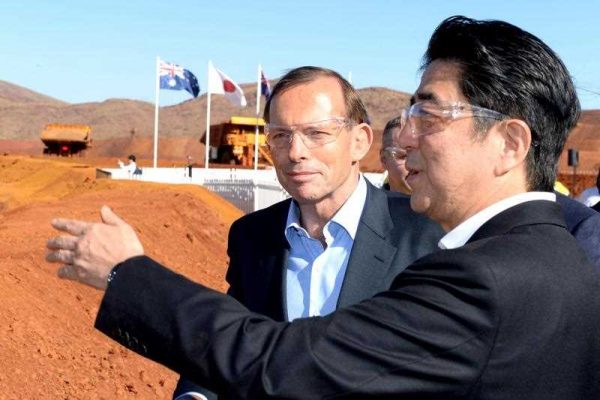Understanding this central fact of the country’s economic circumstance in the world is an essential credential of responsible political leadership in Australia — one that it seems has to be learned, again and again.
Australia supplies over half of Northeast Asia’s externally procured strategic raw materials, such as iron ore, and is a crucial element in the region’s economic security. Australia is not the only supplier, of course, as Asia’s vast appetite for industrial inputs is satisfied from suppliers around the world, including Latin America and increasingly Africa. Asia is heavily dependent on a range of external suppliers for strategic raw materials including energy, though Australia is the single largest element by far, because it has developed an industry that is unmatched internationally in its efficiency and technologies and has the cost advantage of serving customers in Asia — its own backyard. Even though it exports no oil, Australia supplies around a quarter of Japan’s energy requirements (in the form of LNG, coal and uranium), more than Saudi Arabia.
That is why Asia takes Australia seriously. It represents a crucial element in Asia’s security in terms of strategic resource and energy supply; it is a role that is immensely important to the security of the region and a role of considerable responsibility, regionally and globally. The relationship is also, it hardly needs saying, a critical element in Australia’s prosperity and political security. From this perspective, Australia’s economic relationship with Asia can be viewed as a grand deal between Australia and the region in the form of reliable supply of strategic resources and energy commodities through open and competitive markets in return for prosperity and good political relations with the region.
After the international scramble over industrial raw material supplies and disastrous conflict among the imperial powers before the Second World War, the development of open and reliable markets for resources and other goods under the rules that were set up to guarantee open trade was a major pillar not only of economic, but also of political, security in the aftermath of the war.
Australia has sensibly been at the forefront of promoting and protecting the open rules-based system through the expansion of its world-leading resource trades in Asia — first with Japan, then South Korea, Taiwan, China and increasingly now with India. In the beginning, the trade rules did not work exactly symmetrically to limit against controls and restrictions on resources trade in the same way as they did on trade in manufactured goods. But, steadily through its international economic diplomacy, Australia has helped to balance that out (including through its undertakings to Japan in the Treaty of Friendship and Cooperation of 1976 and its approach to the issue in the GATT/WTO, APEC and other forums) and become an exemplar of reliability in international resource markets.
And that, of course, is in Australia’s own best national interests.
With the return of commodity prices to long-term trend, after the fillip that abnormally high prices gave to industry and national incomes over the past decade, Australia’s bedrock comparative advantage in the resources trade will be tested again in what remain highly competitive international markets. Retaining and expanding market share and maintaining competitiveness against suppliers from Latin America, Africa and elsewhere in the world are the foundation of Australian producers’ holding their place as world leaders in the business.
It’s inevitable that smaller or newer higher cost producers face tough times as the markets tighten. Pressure is on them to get costs down in a more competitive market. Some will go to the wall. Some think that Australia owes them protection from the vagaries of a market that was bound to come back. But as Luke Hurst argues in this week’s lead essay, intervention to protect them from their own decisions would be anti-competitive, illegal under international trade and competition law, and potentially politically dangerous to the regime that is the foundation of reliable international markets. Australia has a large share in iron ore supply to Asia, but does not have a monopoly. The drastic reduction that has taken place in bulk shipping costs also means that Australia’s relative geographic advantage into the Asian market is also worth less than it used to be.
Australian government intervention in the iron ore market to cushion companies like Fortescue that have lobbied vigorously for it would be contrary to Australia’s national interests, have a negative impact on demand for Australia’s iron ore and damage crucial relationships in Asia — relationships that are, as Hurst says, ‘imperative to navigating the impending economic storm Australia faces as it weans itself off the red-dirt rents it has been so reliant on over the last decade’.
At another, higher level altogether, keeping the character of its resource trade relationship with Asia in political perspective is crucial to the continuing strength and success of Australia’s ‘grand deal’ with Asia and to its prosperity as well as its political security.
Peter Drysdale is Editor of the East Asia Forum.

